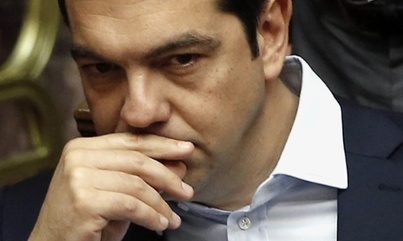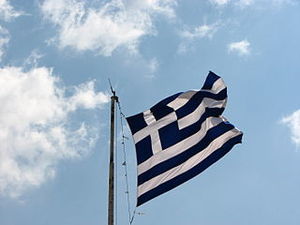Stratoulis' job was given to Pavlos Chaikalis, a former comic actor, from the right-wing partner of Syriza, the Independent Greeks. Deputy Finance Minister Nadia Valvani resigned before the vote. New ministers are expected to be sworn in this Saturday. The main economic ministries remain as they were, with Euclid Tsakalotos remaining as finance minister and George Stathakis staying as economy minister. Yanis Varoufakis the former finance minister also voted against the bailout bill but he had already resigned his position before the last negotiations.
Tsipras has said there will be no elections immediately and not before a bailout deal is agreed upon. Nikos Voutsis, the Interior Minister, said that there could be elections in September or October. The reform bill passed with 229 votes in the 300-seat chamber in the early hours of Thursday morning. The bill includes pension cuts, VAT hikes, reform of collective bargaining, and stringent limits on public spending erasing all of Syriza's "red lines". The bill represented the negation of everything that Syriza had campaigned and fought for. The IMF has criticized the bailout as creating a situation where Greek debt levels will be unsustainable. The IMF claims that severe debt restructuring will be required to make the bailout workable. Additional Sources: http://m.todayonline.com/business/german-lawmakers-back-greek-bailout-despite-rebellion-tsipras-sacks-dissenters http://www.irishtimes.com/news/world/europe/tsipras-sacks-party-rebels-in-greek-cabinet-reshuffle-1.2289114 http://www.telesurtv.net/english/news/Greeces-Tsipras-Culls-Rebel-Ministers-20150717-0019.html
2 Comments
Greek Prime Minister, Alexis Tsipras, was quick to use the analysis to further his own position: "Yesterday an event of major political importance happened. The IMF published a report on Greece's economy which is a great vindication for the Greek government as it confirms the obvious - that Greek debt is not sustainable."
At an IMF board meeting on Wednesday many from Europe questioned the timing of the release of the report. Although there was no vote, US members on the board far outnumber those of the EU so by consensus the publication went ahead. An IMF source said: "Facts are stubborn. You can't hide the facts because they may be exploited." That seems plainly false as politicians and others stubbornly hide unpleasant facts whenever they can. The basic IMF argument is that with a present debt load of nearly 185 percent of GDP the Greek debt burden can be made sustainable only by a great deal more aid and a severe debt restructuring that would involve haircuts. This is precisely what EU countries do not want to hear and a position that they can never sell to their taxpayers. Most of the debt now is public not private so the money lost comes from public coffers. A similar EC debt sustainability analysis is much less pessimistic. It remains to be seen if this new information will influence Greek voters. Recent polls show that the Yes and No votes are literally tied although there has been a decline in the No vote since the banks closed and capital controls introduced limiting withdrawals. PayPal has ceased operations in Greece for now. In the north of Greece bordering Bulgaria restaurants are now accepting the lev, Bulgarian currency, in payment. Business owners then travel to Bulgaria when they have a good number of levs. In Bulgaria they convert the lev into euros to help finance their operations. Sources: http://www.reuters.com/article/2015/07/03/us-eurozone-greece-imf-idUSKCN0PD20120150703 http://www.aljazeera.com/news/2015/07/cash-running-short-greece-150702231536391.html https://www.cryptocoinsnews.com/paypal-shuts-greece-bitcoin-still-operates/
 Greek finance minister Yanis Varoufakis Greek finance minister Yanis Varoufakis The eurogroup is said to be already focusing on Plan B, to deal with a possible Greek default and exit from the eurozone. Jeroen Dijsselbloem president of the eurogroup expressed surprise and disappointment at the sudden Greek decision and said it closed the door on future talks. German Finance Minister Wolfgang Schaeuble also claimed the call for a referendum meant that negotiations were over. The Greek debt crisis however has been far from predictable except for the fact that the Greek government has not been able to persuade the eurogroup and other creditors to pay any attention to its demands for relief from crushing austerity conditions. BBC News reports Greece timeline: Key dates ahead
Additional Sources: http://www.nytimes.com/2015/06/27/business/international/greek-debt-talks-enter-final-stages.html http://rt.com/news/270169-eurogroup-plan-greece-default/ http://www.consilium.europa.eu/en/press/press-releases/2015/06/27-eurogroup-statement-greece/ http://www.nbcnews.com/news/world/greece-debt-crisis-lines-form-atms-pm-seeks-referendum-bailout-n383006
This is the only way in which it can become independent again and able eventually to introduce programs that the people desire rather than Greece's creditors. There is no doubt there would be considerable painful adjustments to be made but recovery could come rather quickly as the low value of the Greek drachma will encourage tourism and exports.
So far there is little sign the Tsipras or Varoufakis the finance minister, are planning to default and exit the euro zone. Tsipras appears to remain optimistic that a deal can be reached. However, with the flight of cash out of Greek banks and a horrendous 24.6 per cent fall in revenues in May it would seem that Greece might be so desperate to reach a deal that it will give up its few remaining "red lines" such as pension cuts and labor market reforms. Nevertheless Tsipras said: "The blind insistence of cuts (in pensions) in a country with a 25 percent unemployment rate and where half of all the young people are unemployed will only cause a further worsening of the already dramatic social situation." Many economists would agree but that matters little. What counts are the demands of creditors. If they are not met, there will be no deal. The Greek government may think that the creditors will allow more leeway since they will end up losing billions if Greece defaults but that gamble may turn out to be quite wrong. Some think that Russia might come to the aid of Greece. However the Russian deputy finance minister said that there had been no request for funds from Greece and that in any event Russia lacked the resources to bail out Greece. As with Tsipras, German chancellor Merkel thought a deal was still possible and said to German lawmakers: "I'm still convinced: where there's a will, there's a way. If those in charge in Greece can muster the will, an agreement ... is still possible." There is strong resistance in Germany to providing any further funds to Greece and a slim majority are in favor of Greece leaving the euro zone. Saturday morning BBC News is reporting German Chancellor Angela Merkel has warned there must be a deal between Greece and its creditors ahead of Monday's emergency EU summit. Additional Sources: http://uk.reuters.com/article/2015/06/19/uk-eurozone-greece-idUKKBN0OW18Q20150619 http://www.nytimes.com/2015/06/19/business/international/greek-debt-talks-are-again-fruitless.html?_r=0 http://www.politico.eu/article/greece-must-leave-the-euro/
 The EU creditors are also preparing for this as a possibility. A German newspaper claims that Eurozone leaders are drawing up plans for capital controls on Greece if there is no deal by this next weekend. Greece will be handed an ultimatum deal this week the paper claims. Prime Minister Alexis Tsipras condemned the unrealistic demands of creditors especially demands for pension cuts when pensions have already been significantly reduced. At the same time he said that he was open to resuming talks at any time. The Troika has been insisting for days that time is running out and that Greece needs to decide if it is going to accept the demands of creditors. The time for negotiation is over some have said. Yet Greek negotiators appear to think that they can gain more concessions from the Troika or institutions since the IMF and the European Central Bank have a lot to lose if Greece defaults. The increasing uncertainty over any solution to the Greek crisis was reflected even in US markets with the Dow Jones index continuing to fall but the declines were even steeper in European markets. Tuesday - Markets suffer as Greece teeters on the edge of Grexit - live |
Like this writer's work please donate:
Ken Hanly
Ken is a retired philosophy professor living in the boondocks of Manitoba, Canada, with his Filipina wife. He enjoys reading the news and writing articles. Politically Ken is on the far left of the political spectrum on many issues.
Archives
November 2016
Categories
All
|





 RSS Feed
RSS Feed

